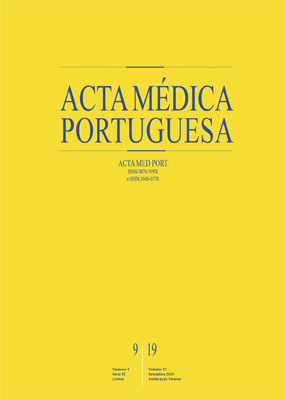Perception and Attitudes About Rational Prescription During Medical Training: Results of Focus Groups Including Medical Students and Residents
DOI:
https://doi.org/10.20344/amp.10945Keywords:
Clinical Competence, Education, Medical, Pharmacology, Clinical, Portugal, Prescription DrugsAbstract
Introduction: Clinical pharmacology educational strategies for medicine students seek to foster skills that range from technical knowledge to the development of behaviors that ensure rational prescribing decisions. The authors present the results of a study to evaluate the perceptions, attitudes and behaviors linked with rational prescribing throughout training.
Material and Methods: Four focus groups were held with first, third and fifth year medical students and residents from the first years of various specialties, with a total of 29 participants. A semi-structured questionnaire with open-ended questions was used to facilitate interaction between the participants, alongside case-studies to explore the behaviors associated with therapeutic decisions.
Results: The analysis of the references showcased an evolution of concepts throughout academic training. References regarding guidelines and effectiveness emerge during the third year; safety and treatment personalization emerge during the fifth year and specialist training. Efficacy studies, systematic reviews, regulatory documents and online platforms were considered the most relevant sources of information.
Discussion: The literature review showcases the need to implement strategies dedicated to the development of adequate skills for rational prescribing. The use of focus groups may be a useful methodology to engage students in self-evaluation of their skills and inform faculty of the perceptions and behaviors of students.
Conclusion: This analysis illustrates the awareness of students and young physicians to the need to adapt therapeutic approaches to the characteristics of the patient. These concepts should be reinforced so that young doctors feel more prepared for rational prescription in complex clinical situations.
Downloads
Downloads
Published
How to Cite
Issue
Section
License
All the articles published in the AMP are open access and comply with the requirements of funding agencies or academic institutions. The AMP is governed by the terms of the Creative Commons ‘Attribution – Non-Commercial Use - (CC-BY-NC)’ license, regarding the use by third parties.
It is the author’s responsibility to obtain approval for the reproduction of figures, tables, etc. from other publications.
Upon acceptance of an article for publication, the authors will be asked to complete the ICMJE “Copyright Liability and Copyright Sharing Statement “(http://www.actamedicaportuguesa.com/info/AMP-NormasPublicacao.pdf) and the “Declaration of Potential Conflicts of Interest” (http:// www.icmje.org/conflicts-of-interest). An e-mail will be sent to the corresponding author to acknowledge receipt of the manuscript.
After publication, the authors are authorised to make their articles available in repositories of their institutions of origin, as long as they always mention where they were published and according to the Creative Commons license.









